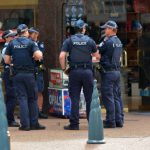Private Criminal Prosecution to Be Launched Against Christian Porter

Former Federal Attorney-General Christian Porter recently abandoned his defamation proceedings against the ABC and has, so far, avoided an independent inquiry into his alleged sexual assault in parliament of a woman who committed suicide last year, as well as a criminal prosecution.
Now, members of the New Liberals Party have announced they will be commencing a private criminal prosecution against the current Minister for Industry, Science and Technology
The party’s candidate for Robertson, Vania Holt has a background in criminal law, having spent six years as a prosecutor for the Office of the Director of Public Prosecutions.
Ms Holt says she has engaged Sydney criminal defence barrister Mark Higgins to lead a private criminal prosecution against Mr Porter over the allegations.
The ‘Porter Dossier’
The Porter Dossier was released by the Federal Court last week.
It contains a statement by the victim including graphic details of her allegation that Porter raped her three times in the early hours of 10 January 1988.
It also includes comments by friends that the victim felt “the risk of killing herself if she did pursue the claim had to be weighed against the risk of killing herself if she did not pursue the claim”, and a number of witnesses who were available on the night of the alleged sexual assault who would be able to give circumstantial evidence.
Private criminal prosecutions in New South Wales
Section 49(1) of the Criminal Procedure Act 1986 provides that:
If a person other than a police officer or public officer is authorised under section 14 of this Act or under any other law to commence committal proceedings against a person for an offence, the person may commence the proceedings by issuing a court attendance notice, signed by a registrar, and filing the notice in accordance with this Division.
A caveat to the mechanism is contained in subsection 49(2), which makes clear that:
A registrar must not sign a court attendance notice if:
(a) the registrar is of the opinion that the notice does not disclose grounds for the proceedings, or
(b) the registrar is of the opinion that the notice is not in the form required by or under this Act, or
(c) the registrar is of the opinion that a ground for refusal set out in the rules applies to the notice.
Subsection 49(2) proceeds to state that:
If a registrar refuses to sign a court attendance notice proposed to be issued by any such person, the question of whether the court attendance notice is to be signed and issued is to be determined by a Magistrate on application by the person.
Section 14 of the Act is headed ‘Common informer’ and provides that:
“A prosecution or proceeding in respect of any offence under an Act may be instituted by any person unless the right to institute the prosecution or proceeding is expressly conferred by that Act on a specified person or class of persons.”
Pro-forma court attendance notices are available on the Local Court website.
Those who commence private prosecutions that are ultimately unsuccessful can be ordered to pay the defendant’s legal costs.
Failures by NSW Police
Several questions have been raised in relation to the police investigation of Mr Porter, or lack thereof, including the fact that NSW Police failed three times to interview the alleged victim before she committed suicide last year.
NSW Police in fact turned down an offer from South Australian Police to interview the woman because travelling during Covid was problematic – reasoning which has not prevented officers from travelling to conduct other interviews outside the state, and ignoring the fact interviews can and are undertake by way of electronic means.
NSW Police shut down the case shortly after it was made public, based on a lack of evidence and the fact that the alleged victim had already taken her own life.
Hearsay evidence
While much of the evidence in this particular case is likely to be ‘hearsay’, sections 60 to 75 of the Evidence Act contain numerous exceptions to the rule against the admissibility of hearsay evidence, which include:
- Where the evidence is considered to be ‘first-hand hearsay’, which is where a person has personal knowledge of the asserted fact if his or her knowledge of the fact was, or might reasonably be supposed to have been, based on something that the person saw, heard or otherwise perceived,
- Where the maker of the statement is unavailable, such as where they are outside Australia and cannot be brought back, or where they are deceased, and
- Where the evidence is relevant for a non-hearsay purpose,
Christian Porter strongly denies the allegations against him.
However, given his position of power as a member of Federal Parliament and the former Attorney General, the chief law officer of the land, there has been significant pressure for an independent inquiry into the matter.
Prime Minister Scott Morrison has so far refused to accede to these calls, instead providing a convenient but misinformed explanation that the ‘rule of law’ stands in the way of an inquiry.








